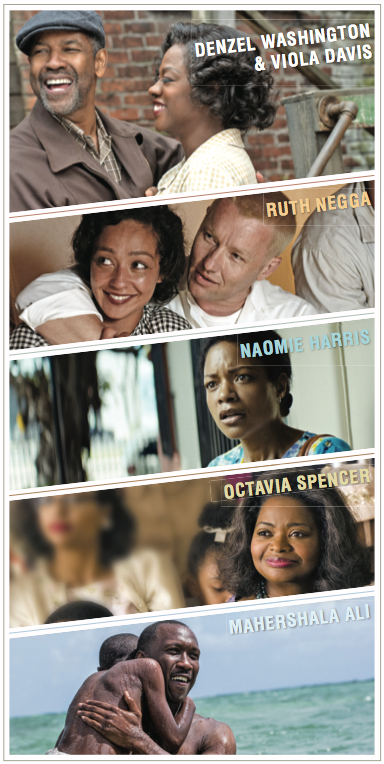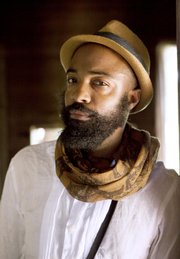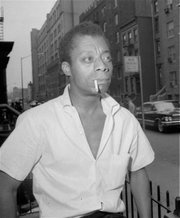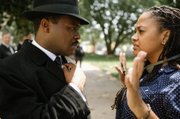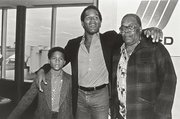The Oscars are not so white this year.
More people of color are nominated than in any other year in Oscar history, including a record-breaking three black best supporting actress nominees. So it at least looks like the public relations problems of the past two years -- in which no black actor received a nomination -- have been avoided.
Seven of the 20 acting nominations went to nonwhite actors this year.
Denzel Washington, who also directed, is nominated for best actor for his work in the film version of August Wilson's 1983 play Fences, about the thwarted dreams of a former Negro League baseball star working as a garbage man in 1950s Pittsburgh. And while Casey Affleck is widely viewed as the favorite to win in this category for his tightly wound work in Manchester by the Sea, last week Washington scored an upset at the Screen Actors Guild Awards.
"I didn't have faith," Washington said in his SAG acceptance speech. "I said, 'That young boy is going to win this. You ain't going to win.' I didn't even prepare. But I am prepared."
Affleck may still be the odds-on favorite -- he won at the Golden Globes, the Critics' Choice Awards, the Gotham Awards and the New York Film Critics Circle -- but most observers see the race tightening. One of the reasons is that Affleck has been dogged by allegations of sexual harassment lodged by two women, a producer and a cinematographer, who worked with him on his "experimental" 2010 documentary I'm Still Here that starred Joaquin Phoenix. Affleck has denied the women's claims, but both cases were mediated and settled out of court, with Affleck paying each of the women undisclosed sums.
While Affleck's Oscar chances may have been diminished by the allegations, some have pointed to the evaporation of the awards chances of Nate Parker, the black writer, director and star of the 2016 drama The Birth of a Nation. About a year ago, after The Birth of a Nation won the Sundance Film Festival's Grand Jury Prize and was acquired by Fox Searchlight for a record $17.5 million, lots of critics were calling it an early favorite for Oscar glory. But when the film was released in October, there were revelations that Parker and the film's co-writer Jean Celestin had been accused of rape when they were in college in 1999.
Parker was acquitted while Celestin was initially convicted. But the case against him was ultimately dismissed on appeal, after the alleged victim declined to testify again in court. Variety reported she killed herself in 2012.
This horrible story overshadowed the theatrical release of The Birth of a Nation, which includes a pivotal rape scene. Many of the mixed
reviews that appeared in the wake of the release mentioned the allegations against Parker, who struggled to address them, and the film vanished from the awards conversation.
It is important to understand that there are real differences in the cases, and that there exists a wide range of sexual misconduct that falls short of rape. Affleck and Parker were not accused of equivalent behaviors. Still, the white guy may be in the running for an Oscar; Parker's film, once considered a shoo-in for multiple nominations, was shut out.
"We were hoping to get a best picture [nomination], at the very least, and I think that there are other forces in our industry and there's a lot of racism," The Birth of a Nation actor Jason Stuart said at the NAACP Image Awards nominees luncheon on Jan. 28. "But what I've learned in the last year is that some people can slide through and some people can't. Nate Parker, in the court of law, is an innocent man. All that aside, this is a brilliant film."
...
While racism can still be found in Hollywood, it's interesting that three of the SAG Awards' four film acting awards went to black actors, with Viola Davis, Washington's co-star in Fences, winning for best supporting actress and Mahershala Ali winning best supporting actor for his work as a compassionate crack dealer in black director Barry Jenkins' Moonlight. (SAG's best actress award went to Emma Stone for La La Land.) Davis and Ali are nominated for Oscars in the same categories.
Moonlight picked up seven additional nominations (the most nominated film this year was La La Land, with a record-tying 14) including best supporting actress for Naomie Harris. Moonlight was also nominated for best picture, best director, best adapted screenplay, best editing (Joi McMillon, nominated along with Nat Sanders, is the first black woman ever nominated in the category), best cinematography and best original score.
Hidden Figures, based on the true story of black female mathematicians working in the early days of the U.S. space program, is up for best picture and best adapted screenplay and scored a best supporting actress nomination for Octavia Spencer. Ruth Negga was also nominated in the best actress category for her role as Mildred Loving in Arkansas native Jeff Nichols' Loving, based on the true story of a couple who challenged Virginia anti-miscegenation laws in the 1960s.
Most stunningly, four of the five nominated films in the documentary feature category were directed by black filmmakers: Ava DuVernay's 13th, Ezra Edelman's O.J.: Made in America, Raoul Peck's I Am Not Your Negro, and Roger Ross Williams' Life, Animated. (DuVernay is the first black female director to be nominated in this category; in 2010 Williams became the first black director to win an Academy Award for directing and producing a film, short or feature for his documentary short Music by Prudence.)
Bradford Young (Arrival) is the second black cinematographer to receive a nomination. Manchester by the Sea producer Kimberly Steward is the second black woman nominated for best picture.
And let's not forget Anglo-Indian actor Dev Patel's best supporting actor nomination for his role in Lion. All and all, you might say it's been a pretty diverse year for Oscar.
...
Still, an empirical analysis of the ethnic background of actors nominated for the Oscars any given year tells us very little. There are still inequities: A female cinematographer has never been nominated. Female directors are still in short supply -- aside from DuVernay, only Daphne Matziaraki and Kahane Cooperman were nominated, both in the documentary shorts category for 4.1 Miles and Joe's Violin, respectively. According to the Women's Media Center, 80 percent of the year's nonacting nominations went to men.
And not all Oscar movies are created equal. Hidden Figures is a good enough family movie with an uplifting message, but it's hardly sophisticated in its critique of America's racial divide; too often it seems to default to a patronizing do-gooder view of racism as a symptom of moral failure rather than an insidious and inherent feature of society. It's a movie like The Help in that it allows its white audience to divorce themselves from the ugly actions committed by a few stupid and mean racists who appear onscreen. While it showcases the talents of some fine actors, it doesn't especially challenge its audience to consider how complicit they are in the institutional bigotry that lingers in our society.
This makes it exactly the sort of movie that the Oscars typically honor: pretty good, but also pretty safe.
Compare it to Nichols' probably too subtle Loving, directed by a white Southern male (Hidden Figures is directed by a white guy from Brooklyn, Theodore Melfi), an elliptical love story in which his characters resist Oscar-grasping speeches and histrionics to speak in mostly calm, resigned tones. Not even ugly racists feel the need to shout here -- after all, they have the authority of law to wield. They legislate and adjudicate.
Negga's best actress nod was the only Academy Award nomination Loving received. But Loving isn't the sort of film that gets Oscar nominations. Those go to movies like La La Land, which flatter Hollywood while feinting toward depth.
But La La Land -- a candy-colored musical that tends to either charm or underwhelm -- is not a film that can withstand much scrutiny. It's not a movie that rewards much thought. And that's OK if you receive it in the right spirit. But if you start parsing the character Ryan Gosling plays -- a traditionalist jazzbo intent on saving the form from sellouts like the one played by John Legend -- well, it doesn't take long before you're in the high weeds, arguing the inherent fluidity of jazz and the inappropriateness of whitesplaining it.
That's too much like pulling off the butterfly's wings. I'd rather appreciate the film as silly bauble about attractive kids in Hollywood and then forget it.
But then the Academy had to go and give it 14 nominations, which would seem to argue that it's an important movie. It's not. It's probably fair to question writer-director Damien Chazelle's choices (he obviously knows and cares about jazz; he didn't offhandedly cast Gosling as a jazz pianist), but the question seems tedious.
Most movies get most things wrong -- and they're allowed to. They're not required to be faithful to the realities or politics of the world. Their only responsibility is to engage and entertain. In real life, Gosling's character would come across as an insufferable boor, but he's OK as a tragic cartoon.
...
Still, it's probably not a good idea to take any individual year as evidence of reform. We might be better served looking at minority representation in all movies than at the relatively small sample provided by Academy of Motion Picture Arts and Sciences voters. The Academy has made an effort to recruit younger and more diverse members, to make its predominantly elderly, predominantly white membership look more like America. But the sudden uptick in the number of blacks nominated for awards wouldn't seem to have an awful lot to do with any Twitter hashtag campaign. All these movies were in production before the kerfuffle surrounding last year's Oscars.
It's easy to see this black renaissance as a statistical aberration; Fences, Moonlight and Hidden Figures all came to market at the right time. For different reasons, they all ended up with multiple nominations. Most serious people understand that Oscar nominations (and wins) happen for all sorts of reasons that have little to do with the quality of a film or a performance. Academy voters are human beings, each with their own set of prejudices and lines of allegiance. Some vote without seeing the movies they're voting for, others vote for political or personal reasons. They favor friends, they get sentimental. They default to what they find comfortable and reassuring.
How else to explain Meryl Streep's 20th nomination for her pleasant, but otherwise unremarkable role in Florence Foster Jenkins? Streep has her partisans and is the beneficiary of a peculiar privilege -- voters searching for a name to fill out a ballot inevitably feel safe scratching hers down. But for all her undeniable gifts, she seems to have a tendency to default to unchallenging, crowd-pleasing roles. The challenges of singing spectacularly poorly aside, this was one of her least interesting movies.
Yet some of the Oscar commentary I've seen attributes the Academy's "snub" of Amy Adams -- considered a lock to be nominated and a possible favorite to win for her role in Arrival -- to Negga's unexpected nomination instead of Streep's obligatory one.
Both Negga and Adams did fine work in movies that were more serious and better realized than Florence Foster Jenkins, yet Streep's reputation and standing with the Academy secured her position. Streep probably won't win (though she could, especially after her Golden Globes speech blistering the new administration), but her perennial status as a nominee effectively narrows the chances of any other actress gaining a nomination. This is the real effect of the Academy demographic. It's not that black actors are discriminated against so much as old favorites get recycled.
So it's refreshing when a Martin Scorsese or Tom Hanks is denied a nomination (I haven't seen Scorsese's Silence yet, but Hanks was really fine in Sully) because it opens up the field to new talents. One way to look at the Oscars is as a spectacle designed to advertise Hollywood product -- which means it doesn't matter much who wins in a given year (except to the winners, who can receive real benefits from a nomination, much less a win).
Recently, as an experiment, I asked a class of about 80 folks who'd signed up for the weekly lecture on movie culture I give through Little Rock's LifeQuest program if they could name last year's best picture winner. I had forgotten, and I figured that perhaps half of them had as well. As it turned out, no one in the class could remember that Spotlight had won best picture last year.
Someone had to Google the answer on their phone.
Email:
pmartin@arkansasonline.com
blooddirtangels.com
Style on 02/05/2017
